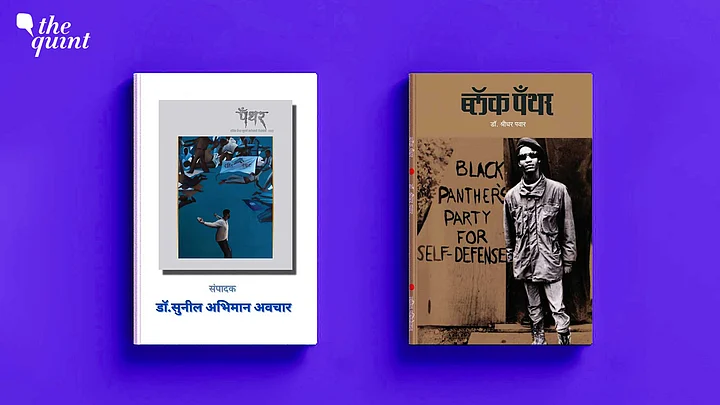In 2022, Ambedkarites celebrated the golden jubilee of Dalit Panther – a militant organisation founded by Dalit youth in Mumbai in 1972. As part of these celebrations, two new books have been written in Marathi, one that revisits the legacy of Dalit Panther and another that tells the history of Black Panther Party (BPP).
Sunil Abhiman Awachar has meticulously edited the book on Dalit Panther to bring together older and younger generation of activists, intellectuals, writers/poets and artists to (re)introduce the organisation to the Marathi readers.
"Dalit Panther's history is a glorious chapter in the anti-caste movement. And this history must reach the new generation," says Awachar.
The book was recently released at the hands of Shiv Sena (UBT) chief and former chief minister of Maharashtra, Uddhav Thackeray, at his residence Matoshree in Mumbai. Shiv Sena (UBT) leader Sushma Andhare, one of the founding members of Dalit Panther Arjun Dangle, writer/poets Hira Bansode, Urmila Pawar and Pradnya Pawar and others were present on the occasion.
Awachar told The Quint that we are again facing the same problems that were present 50 years ago – casteism, increased unemployment post COVID-19 pandemic, fundamentalism and curtailed freedom of speech. This makes the struggle of Dalit Panther relevant for the current times, he says.
Dalit Panther rose as a response to the heinous crimes against Dalits in Maharashtra. The members of the organisation were mainly drawn from emerging writers, poets and intellectuals. However, the fight against casteism was not fought in the pages of newspapers and magazines but on the street. The Panthers took out protest marches, organised sabhas, went around Dalit bastis in Mumbai raising awareness, visited victims of crimes to offer them help, and also met politicians to pressure them into action.
Dalit Panther gained immense momentum and media attention within a short span of time. But it could not sustain itself. In about three years, the organisation saw a major split, with one group aligning with Raja Dhale and the other with Namdeo Dhasal.
Even though Dalit Panther was a short-lived experiment, it cast a long shadow and continues to inspire the current generation. The number of events organised and books published on the organisation's golden jubilee are a proof of that.
"It is important to revive the discourse of the Panther. The new generation needs to be sensitised and we need to develop new perspectives by taking them on board," Awachar asserts.
Along with essays by founding members like JV Pawar, interview with Arjun Dangle, and other scholarly essays, Awachar has given space to poems and illustrations by younger writers and artists, which has given a different form to the book.
Dalit Panther was directly inspired by Black Panther Party. The BPP was founded by two college students, Huey P Newton and Bobby Seale in Okland, California in 1966. Shridhar Pawar's book, which will be published soon, tells the story of this African American militant organisation.
"Both Dalit Panther and Black Panther were founded by youngsters. While the Sidharth Vihar hostel in Wadala, Mumbai was the focal point of Dalit Panther activities, Merritt College in Oakland played a similar role for the BPP," says Pawar.
Pawar has divided the time period of BPP in three stages – 1966 to 1971, when it was a truly revolutionary, militant party and espoused Marxist-Leninist-Maoist ideology but when it also faced immense State repression, resulting in the killings and incarceration of many Panthers; 1971 to 1974, when it took to reformatory programmes and entered electoral politics; and 1974 to 1982 when the party was dominated by women leaders but when it was also in a much diminised state.
Pawar also extensively notes the circumstances and antecedents that gave rise to the BPP.
While talking about what brought him to the topic, he told The Quint, "I was always fascinated with the 1960s. It was a truly revolutionary decade. You had students protests in France, protests against America's Vietnam war, various anti-colonial struggles, Naxalbari in India, Dalit literary movement and so on. It is not surprising that the BPP and Dalit Panther emerged around this time."
When people are celebrating the golden jubilee of Dalit Panther, Pawar wanted Marathi readers to get to know the BPP as well since it was the inspiration behind the former.
Pawar says that there is not a single book in Marathi that gives a comprehensive account of the BPP. "Actually, I asked many people if there was any book about Black Panthers in Malayalam, Punjabi, Kannada and other Indian languages. The answer was no. So this is probably the first book about the BPP in any Indian language," he states.
